A version of this essay originally appeared in print in The New Territory, Issue 10.
The texts from Nammin came in rapid-fire. I was sitting at my desk in the open office of the Scottsbluff Star-Herald newspaper. Before I could read them all she called.
“Some guy just came in and started yelling at me, telling me to go back to Korea, that my husband was a fucking idiot. Security got him. I’m shaking right now.”
I got in my truck and drove north to the hospital, where she worked as a barista at a coffee kiosk. I parked near the emergency entrance.
“That’s him right there,” she said. Across the lot a short, round man with red hair leaned against a rusted-out, early ’90s Chevy Cavalier. A hospital security guard stood over him, the red-haired man not speaking, looking down like a child under a scolding parent.
Nammin told me what happened. She said the guy came in and asked how much a cup of coffee was, though the prices were listed on a signboard above the kiosk. It started hostile and got worse. “Welcome to America,” he said. “I don’t mean that, by the way.” He asked how she ended up in Scottsbluff. She explained. Then he went on a spitting tirade about how much of an idiot I am and how he hated what I wrote in the newspaper, in particular my columns in favor of progressive ideals.
Nammin couldn’t escape his rage. There was no button under the counter to call for help, no trap door lever. A woman who worked in the guest services office heard the yelling, came out, and found security. That’s when Nammin texted, then called.
“Should I go over there?” I asked her, looking through the windshield at the guy standing by his car.
Nammin talked me down, saying he wasn’t worth it. “But I wanted to punch his face,” she said.
“Somebody should,” I said.
We watched him shuffle around his car, get in, and drive away. We both went back to work.
Back at the office I told my editor Steve what happened.
“I probably would have ended up in jail if that was me,” he said. “Looks like you have your topic for this week’s column.”
I sat down to write my story, not knowing the man’s name, not knowing that his hatred for me and my family was rooted in a conflict that began decades ago.
~~~
The town of Scottsbluff, Nebraska, the largest populated area in the Panhandle on the state’s western end, claims as its legacy an importance to pioneers who trudged and suffered and died along the Oregon Trail. We all learn in school that Chimney Rock—about 20 miles east of town, and one of the more recognizable topographical features in a state better known for farm fields—was an important geographical marker along the trail for settlers and their oxen-drawn wagons. The eroding finger of clay and sandstone is on the state quarter behind a covered wagon.
When Nammin and I met at a nightclub in Seoul, talking over house music pulsing in the background, she hadn’t heard of Nebraska. She used her phone to Google my home state. The first image result was Chimney Rock. “I can see that from my parents’ house,” I told her. She didn’t believe me until we were standing on the farm a year or so later, looking out over the valley—there was the spire, not huge, but not insignificant either, rising up from the horizon.
We had been dating for less than a year when I was sitting in a Seoul coffee shop and my phone rang from a long string of numbers I knew to be an international calling card. My mother told me my grandpa had terminal cancer and advised me to come home and say my goodbyes. I said I would and sent out a few emails to people I wanted to see when I came back. One I sent to Steve, who had mentored me as a budding reporter a few years before I left for Asia. My message had said I would be in town and that we should grab a beer. He sent a reply with the subject line: We need to talk. He explained the assistant editor was quitting to take a teaching job, that Steve was nearing retirement age, and that I might be able to take over the paper as editor one day soon. Regardless, he wrote, let’s go fishing.
That April I flew across the Pacific Ocean toward home. All of our immediate family had gathered at my parents’ house and took pictures, my grandpa still clear-headed and upright. A day later, early, in the pre-dawn 4 a.m. light I drove to Steve’s house. For the job interview we took his boat 70 miles up to a Sandhills lake. We caught at least two dozen bass and northern pike, staying out until the wind picked up and we had enough fish for ceviche, which we made back at Steve’s, along with margaritas. He mentioned that if I accepted he would expect me to mentor a few of the talented younger reporters on staff. I didn’t make any promises, but how could I say no to an offer to come home after seven years of bouncing around from coastal U.S. cities to Korea and back again? Although I sensed the reverse culture shock would be difficult, I had long ago subscribed to the philosophy that movement was always better than stasis. I asked Nammin if she wanted to come with me and to my surprise she said yes. We hadn’t been dating that long, and even though I tried to explain to her what Nebraska was like, I wasn’t sure she understood just how different our lives would be. We signed marriage papers at City Hall in Seoul in July, and on August 1, I was the assistant editor of the Scottsbluff Star-Herald. The paper I had grown up reading, that I had watched my dad read in his chair every night as a child.
~~~
If you’ve ever been tempted to move back to your hometown as an adult here are a few things to consider: You will be at the mercy of unbidden, uncontrollable memories. Simply driving down a street or stepping into a building could trigger a childhood scene you haven’t thought about since it happened, and the flashback might be vague, a face with a name you don’t recall, a moment of temporary release through an act of vandalism or property destruction. You’ll try to explain and investigate these phantom reminiscences. Good luck with that. Not all of your memories are formless teases of the past — you have just as many clearly defined moments to access — but the surprise memories you are forced to sift through years later can cause you no small amount of existential angst. Why was I like that, you ask yourself, and your theories shift and change beneath you.
To come home to the place of your childhood to live as an empathetic adult is the opposite of getting away with it. No matter the consequences at the time, you are reminded of who you were and how you acted, and, if you are sensitive to your memories and wish to be better than your younger self, then the punishment for your bad behavior is that no matter how much you would like to, you can’t change your past. You simply have to live with it, and the reminders of what you were, what you did.
If you think planting flowers in your front yard, helping your dad clean the gutters, joining the United Way — if you think any of that will absolve you of your past then you’re going to be disappointed. You’ll want to say I’m not like that now. I’ve changed. But it won’t matter. People themselves have to change to believe that you have changed, and most people don’t change. Redemption is a joke to a place that refuses to be redeemed.
The unbidden memories are the toll I paid to live in a place where I knew the land, the history and how the community worked better than anywhere else. I explored this small postage stamp of a region as a child and knew places like the turnoff on County Road X where you can hike to a small pond crowded with noisy bullfrogs and bright blue and orange dragonflies and not see another person all day. Places I could never find in a new city or country.
~~~
To work in a small town newspaper is to be at the mercy of the telephone. We’re told that journalists have thick skins, or should at least try to toughen theirs if they want to survive the job. I’ll tell you that your hide can easily be pierced when your phone rings and it’s the grandmother of a childhood friend complaining because the copy desk ran a large photo on the front page of two women getting married at the courthouse the day gay marriage became federally legal. “You’re anti-Christian, and that’s a liberal idea,” she told me. “I’m going to cancel my subscription.” I started one day with an email with the subject line Disappointed from a cousin’s father-in-law chewing me out for writing a column where I said I quit eating meat. The criticism would be much easier to bear if the names were faceless and had no connection to my childhood and family.
But I still picked up the phone every time it rang. I read every email and letter. I published the letters to the editor that called me a whiny liberal and a lot worse. On the paper’s Facebook feed was where the real ugliness lived. When a troll or critic didn’t want to get into specifics they fell back on the common refrain of “Who reads the paper anymore?” or “This is why your paper is dying” or “We all know the staff doesn’t get paid anything, and this is what we get for the money.” Pointing out the declining state of the industry was a hard point to argue against, even if it was a cheap blow.
Despite the nearly daily negativity I waded through, there were moments of impact and reward. I’ll always carry with me an email I received from my high school social studies teacher that said in his decades of reading the Star-Herald, the editorial I wrote in Friday’s paper was one of the best he had ever read. I often received cards and letters in the mail from supportive readers who treasured the newspaper and knew its importance to society.
When journalists talk about working in small markets early in their careers, they often say they valued the opportunity to make mistakes at that level because screw ups weren’t likely to do real damage to their careers and follow them if they moved to higher levels or larger markets. While that may be true, it’s an ugly thing to hear from the perspective of the people in that smaller market, and it doesn’t take into account that to make a mistake in a small community where everyone knows you is something else entirely.
~~~
In 2016, seventy percent of Scotts Bluff County voters cast ballots for Donald Trump. Anyone paying attention to the politics of the community wouldn’t have been surprised at that percentage.
Our Main Street, named Broadway, had suffered the same fate of so many rural downtown commerce areas. First it lost consumer traffic to a mall built a few miles away in the ‘80s, and what the mall couldn’t kill, WalMart slowly eroded, like the sandstone on Chimney Rock. The old timers remembered when Broadway would fill with cars parked in every space on a Saturday night, when they lived in a town with the hope and promise of a good future.
The turn began in the farm crisis of the mid-80s, when low prices and bad weather and trickle-down economics drove farmers out of business, into bankruptcy, or worse. Though I was a child, I recall family homes situated on nearly every quarter mile of the country, dirt road grid. Before the crisis a household could survive by working the land where they lived, maybe also farming a nearby additional 80 or 160 acres. Nearly a hundred years ago, in Main Street, Sinclair Lewis described how small-town America lived on commerce brought in by hard-working farmers working a quarter-section at a time. It’s not like that now. Today the farmers who lease my parents’ land work hundreds of acres, if not more. They live miles away. Many of the houses that sheltered the children of my generation have been torn down or abandoned, the kids building lives in town or farther cities to work in offices and less labor-intensive careers. The town’s restaurants and shops and overall commerce suffers without them and their families.
On my dad’s side, I come from five generations of American farmers and unknown history prior to that of Volga Germans, ethnic Germans who emigrated to the U.S. from the Russian Empire. It’s likely, though, that my great-grandfather was a farmer back in Russia; if not, then everyone around him was. The Germans from Russia came to settle in Nebraska because they found the land similar to what they knew in the Volga River Valley near Saratov, that it would be good for growing sugar beets.
As we grew older, my siblings and I were advised to go to college, to find another way to make a living. I can still hear my father telling me as we drove around his fields that farming was a good way of life, but there was no money in it. Raising a writer is probably not what my parents had in mind, and no real comfort to them — I traded one poorly paying, good-way-of-life-if-you-can-handle-the-risks profession for another. But still I’m not at the mercy of hailstorms and early frosts, or sugar factories that can’t make payments.
That’s not to say I don’t mourn the generational knowledge lost by taking town jobs and working in offices. When I worked for the newspaper I was aware of my few remaining farm cousins out in the fields on sunny summer days while I spent long hours under fluorescent lights with a tie tight around my neck. It’s easy to over-romanticize the agrarian way — back to the land and all that — but it truly is a noble, purposeful life to grow food for a living. Certainly it is of more practical use than writing editorials challenging the community to consider progressive ideas — a task made more Sisyphean in the age of Fox News on television and right-wing talk radio in the tractor. With every piece of writing calling out conservative ideals I seemed only to be hardening the community against me, rather than helping them achieve some form of imposed enlightenment.
I’ve often said that I was lucky to have been given an opportunity to move to Colorado and cover the legal cannabis industry right as Trump was elected president. I don’t know what would have happened to me, or the reputation of my family, as I wrote editorials condemning Trump’s attacks on the media, or how his trade wars with China were directly opposed to the interests of the farmers who helped him win the election. I imagine I would have been told to write about other topics in management meetings as corporate overlords complained that our “liberal slant” was costing us subscribers and advertisers — neither of which any small newspaper can afford to lose in today’s print journalism economy. For the first couple of years I traded pretty heavily on the simple fact that I was a product of that community, and therefore had a right to criticize and challenge it. But that would have held value for only so long. In fact, I felt that I had already started to see that position weaken.
While the rest of the media world turned its gaze on the center of the country to retroactively cover rural America after Trump’s election, I moved to one of our more progressive cities. It might seem like I fled to the safety of likeminded people because it was easier. In fact, the decision to leave Scottsbluff grew out of the same motivation that drove me to move back in the first place: I was hungry for another challenge, and the cannabis industry was dynamic and alluring. Moving to Colorado was just part and parcel of chasing the next story. That’s not to mention the state of small market newspapers’ financial health. In 2016, we were paying new reporters $24,000 a year to write stories and take their own photographs every day, among many other tasks. When I took the job, no one had received a raise in several years.
People like to think that journalists don’t need to get paid as much as other professions because they’re rewarded in other ways. That’s assuming there’s any glory left in seeing your byline in print, a hollow reward in today’s world of “fake news” and pervasive general contempt for reporters. The community knew the newspaper didn’t pay well, and when mistakes inevitably occurred, or we wrote something unfavorable toward a politician or prominent leader, we were met with a response to the effect of “well, I guess that’s what we should expect when we have such poor caliber people working for the paper.” All while our company had been purchased years prior by Berkshire Hathaway, owned by one of the richest men in the world, fellow Nebraskan Warren Buffett.
How could I justify writing anything that could anger the community enough to lose subscribers or advertisers? The company employed dozens of people — beyond the journalists — who had families to support. And yet how could I call myself a journalist if I didn’t write what I felt was true in response to the day’s politics and social issues?
~~~
In the newspaper office, still rattled by the unexpected chaos of the verbal assault on my wife, I sat down to write a column headlined “We treat people better than that here.” In the first draft, I began with what happened and ended with calling the guy a cretin. Warranted and fair, I thought. Nammin had found out the man’s name that afternoon, but I chose not to include it in the piece. I shipped it to Steve, who gave me a lesson I’ll always remember — don’t use the power of the newspaper to give yourself an unfair advantage. He advised me to tone down the two or three paragraphs where I essentially called the guy a piece of trash. Readers could easily draw their own conclusions on that point, he said.
The column ran on Friday morning and before I sat down at my desk I had messages from friends who got up early to read the paper. One, a lawyer, asked for the guy’s name. She looked him up on Justice.gov and found he had done time in the Nebraska State Penitentiary. “He appears to have impulse control issues,” she wrote me, “I would stay away.” Later that day I ran into the county sheriff at the coffeeshop and he asked the guy’s name and told me he thought I handled the situation well. But the most interesting response came from family. When my dad learned who it was he told me a piece of familial lore I remembered from my childhood but hadn’t heard in a long time.
This is how I understand my family’s version: One Fourth of July decades ago, my grandpa, who lived in town, was at the park having a picnic with his family when someone came by to deliver a message. Trouble at the old farmhouse he rented out. My grandpa drove out to check on it, a gray tower of smoke rising from the fields. When he arrived he saw what was once a stack of hundreds of square hay bales reduced to a smoldering black mound of ashes. He approached the renters who appeared, by the chairs and beer coolers on the lawn, to have been having a little party. He asked what happened and learned someone had lit the haystack on fire with an errant bottle rocket. When my grandpa confronted the party to ask who was going to pay for the destroyed alfalfa, a short, round, red-haired man stood up to him and said they weren’t going to pay him anything. As my recall of the story goes, my grandpa punched the man in the face, then later took him to small claims court.
So the hatred for my family began with the burnt hay and smoldered for generations until it reached my wife, innocent of anything but having married the “idiot” who wrote for the newspaper, whose grandpa punched this man for burning down his haystack 30 years prior.
The community had responded to my column in no small manner — people at the hospital gave Nammin cards and apologized to her on behalf of the town. I received several letters and emails with similar sentiments. In a way, I was relieved to learn that the attack on my wife wasn’t purely a reaction to my newspaper work but rooted in something deeper, a familial tangle of enmity. It made me aware that places have deep memories, and the conflicts we have now can follow us beyond just our lives, could appear in the lives of our children, and even our grandchildren.
There is a power and strength in one family staying in the same place for generations. But that advantage doesn’t come without a price. For all the love and support my family has gained in the community over the past century and more, it stands to reason there would be hatred and disfavor, too. The red-haired man is certainly not the sole Schaneman detractor in Scotts Bluff County, and through my work at the Star-Herald, who’s to say I didn’t make my relatives’ lives a little bit harder. Years from now, if I ever go back to live there, maybe I’ll be the one explaining why some stranger is suddenly acting hostile to a family member in a random public situation. Perhaps because of something I put in the paper.
Despite all of the complications and fraught history, I only have the one hometown, the place I know the best, where I have my sweetest and bitterest memories, where the failures and triumphs flow through generations. I don’t belong where I am now, have no roots in or ties to the neighborhood I come home to each night. No one knows my family name. And as freeing as that can be, it also feels like a lesser way to live. While life might be simpler in an anonymous city where the bad can’t follow, neither can the good.

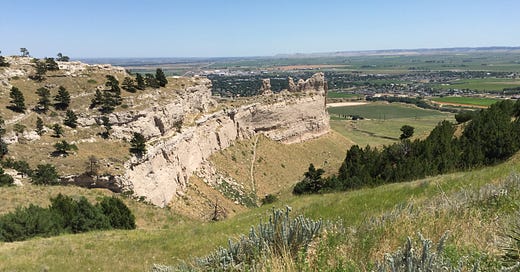



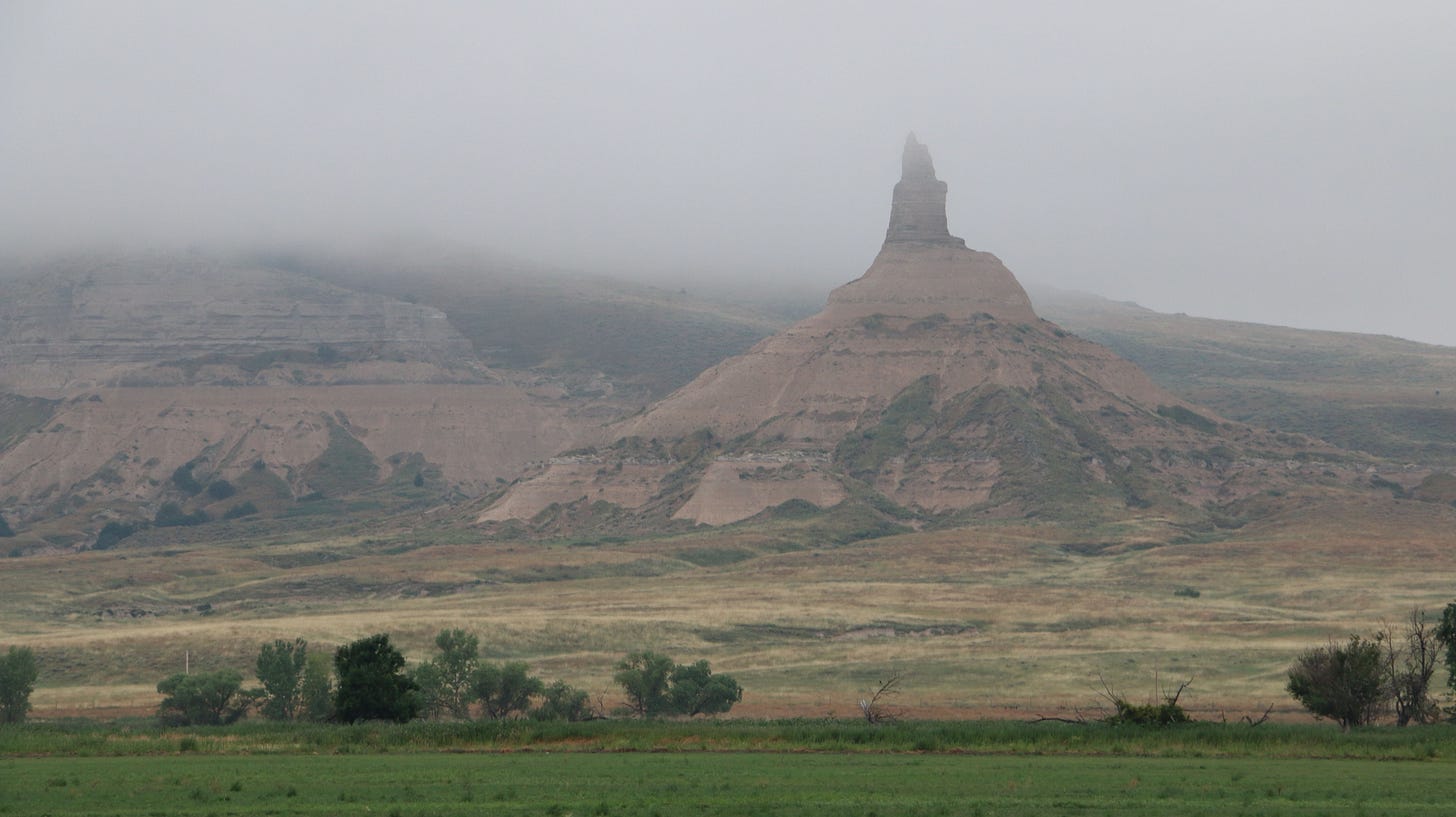
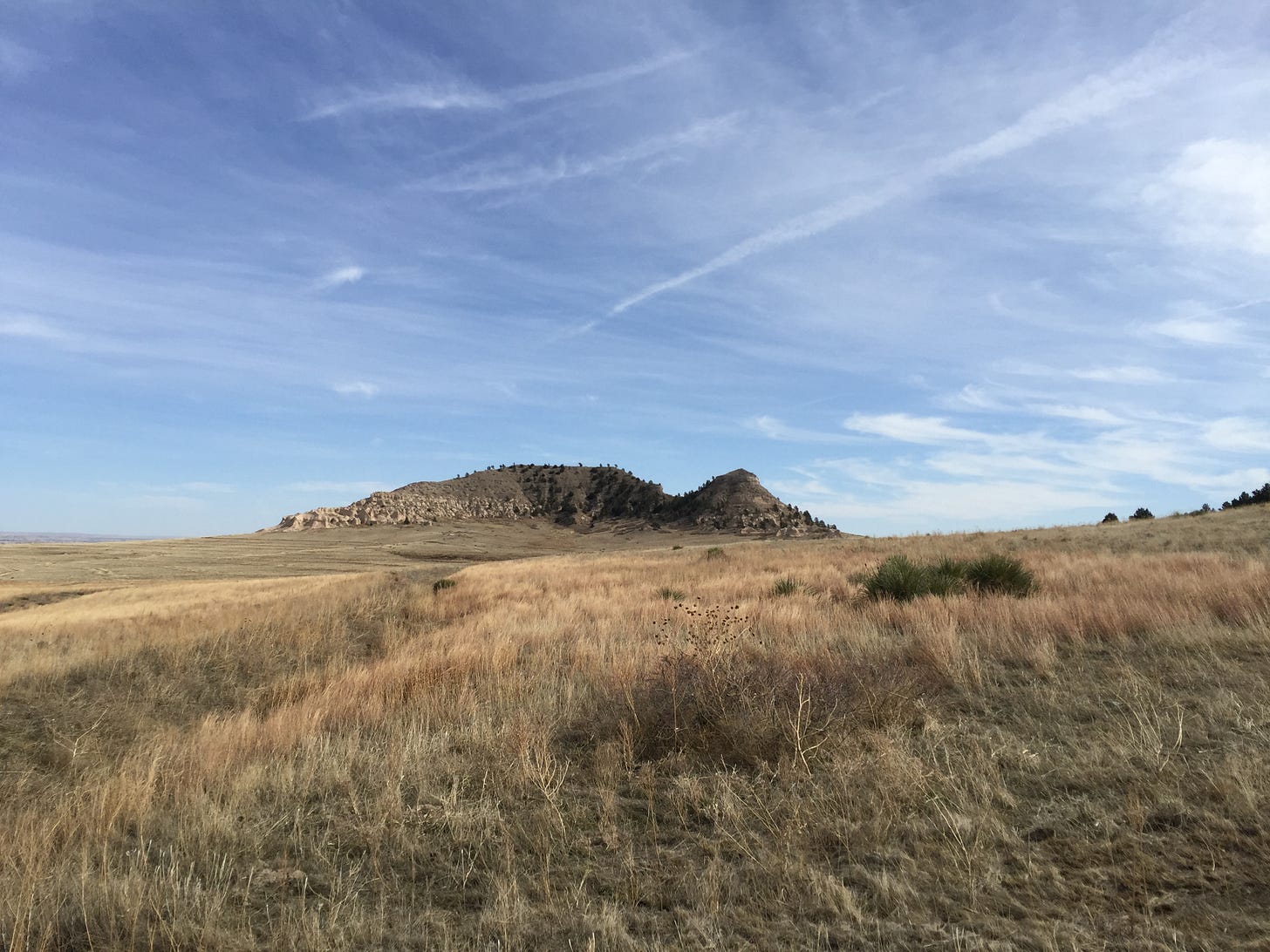
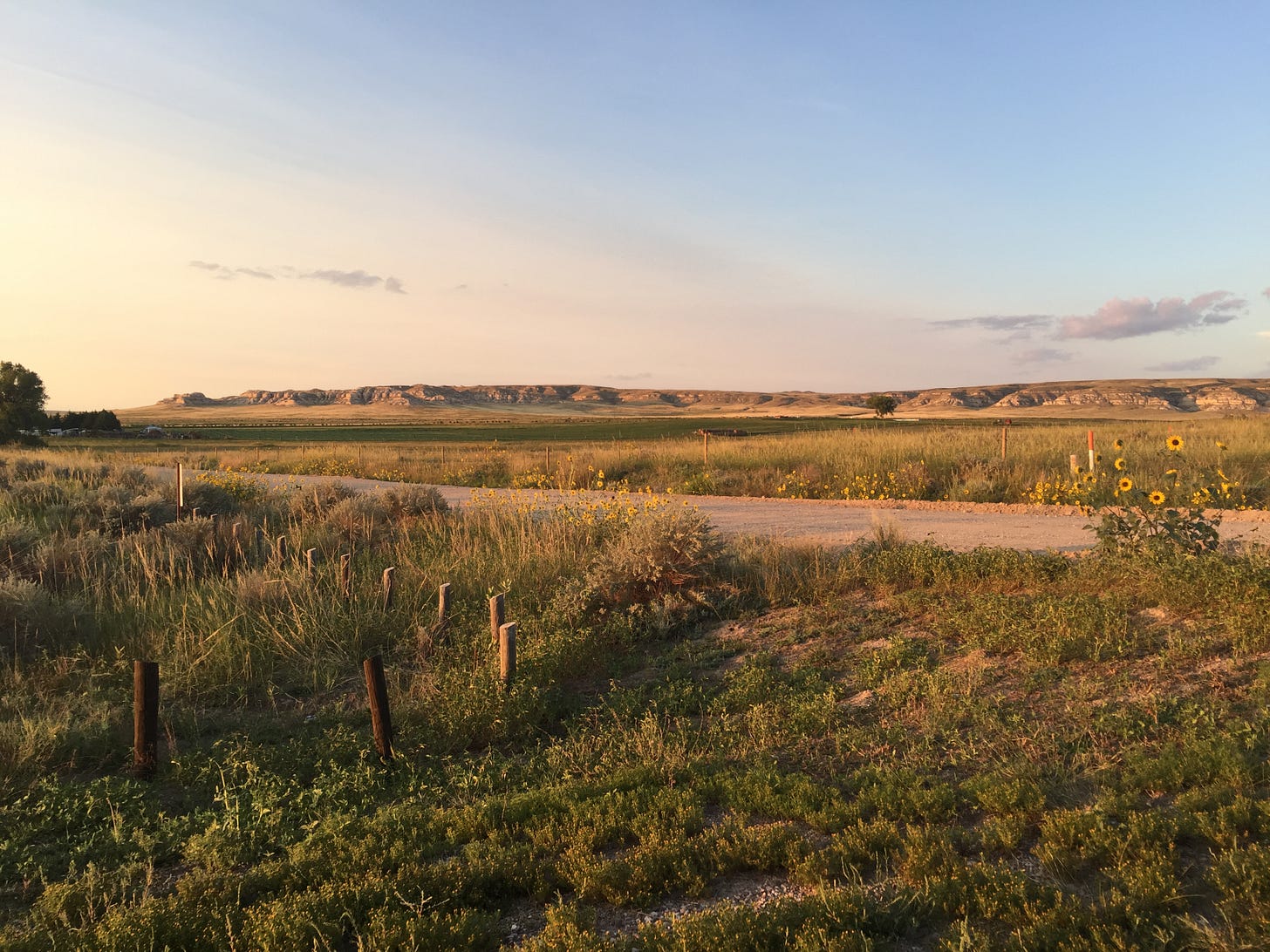
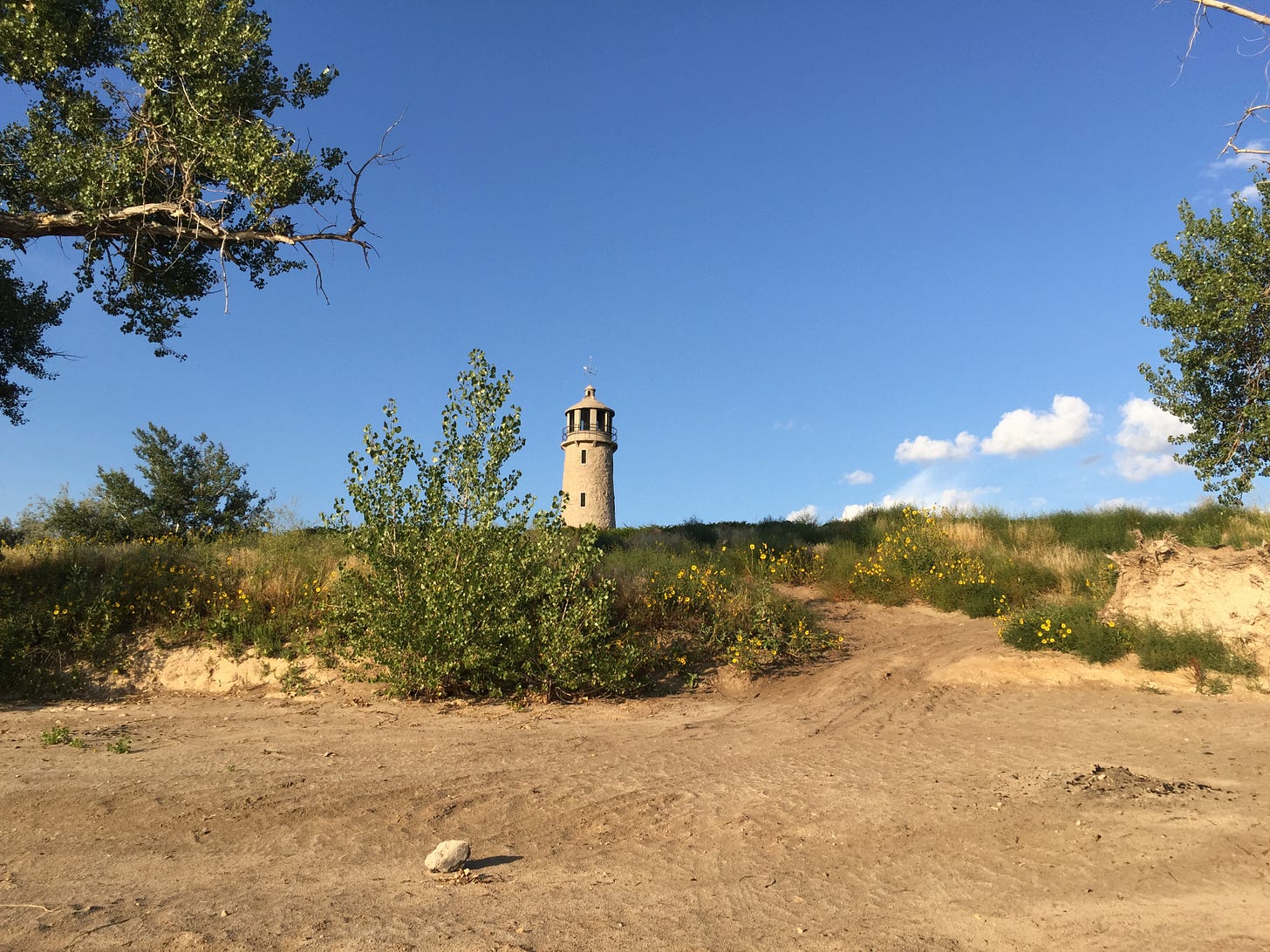
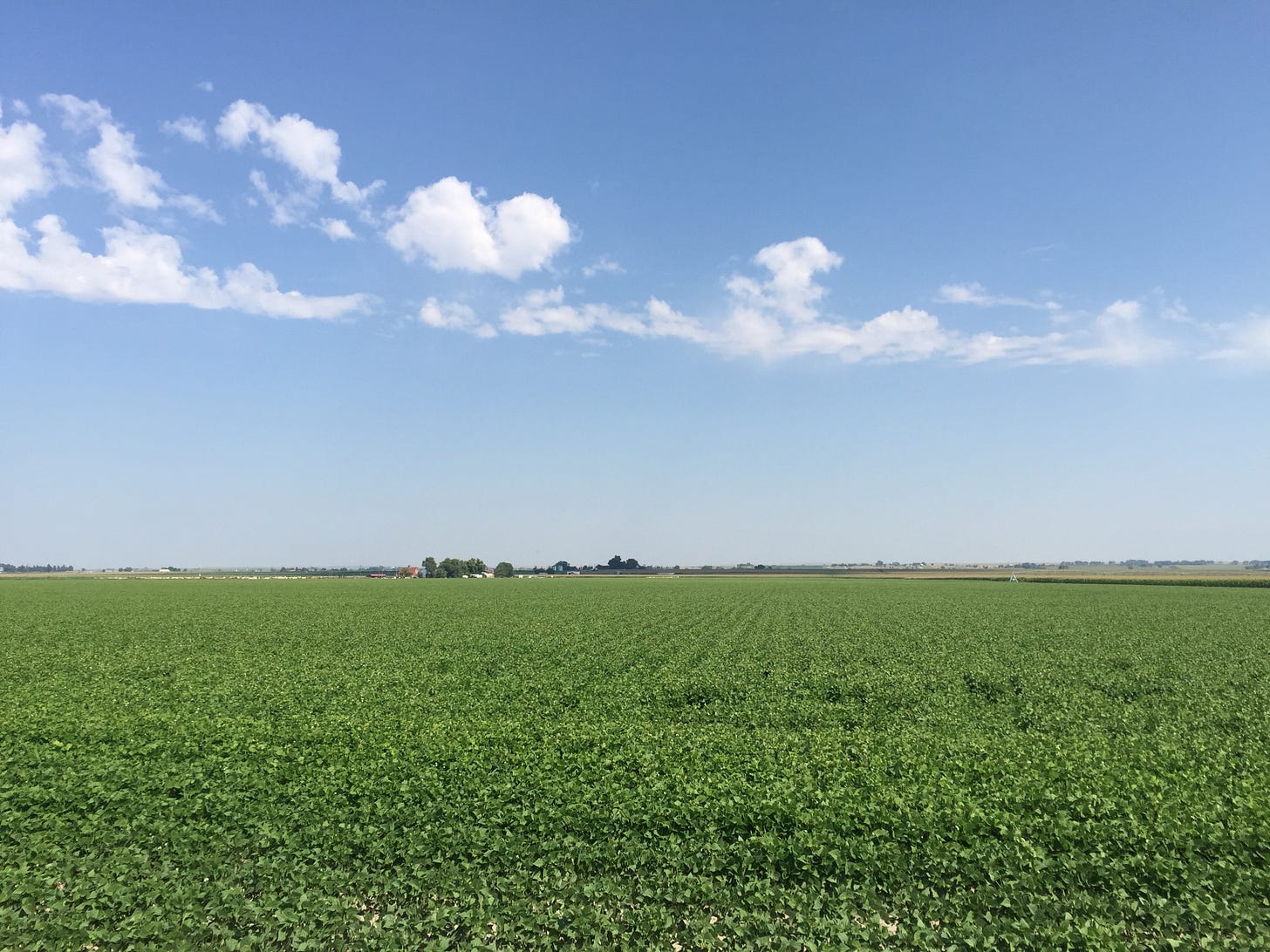

I read The Silence is the Noise years ago after randomly picking it up at Trident. Pretty cool reading the backstory here. Having moved away from my hometown, as well, I feel what you're saying about going back to who you used to be, whether you like it or not.
This was great! I love that about unbidden memories. The long pull of small-town history, your own and the familial deep beyond. I love that country out there. Bet those years at the paper were trip!